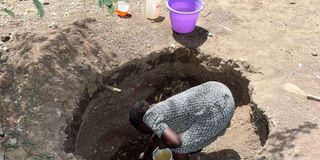Get smart with provision of adequate water for agriculture

This photograph dated January 17, 2017 shows a woman fetching water from a hole she had dug on the dry riverbed of River Nyaidho in Awasi, Kisumu. PHOTO | TONNY OMONDI | NATION MEDIA GROUP
What you need to know:
If cooperative societies, banks, and insurance firms are brought into the business of micro-water management, the narrative will shift from tears to triumph.
What is needed is a reinvigorated consciousness towards water, technology, agriculture and agribusiness.
Rains, thanks to the vagaries of nature, will always disappoint us.
Let’s be smart with water.
Kenya is baking and starving for want of water. We are crying and begging. But what we need is a paradigm shift on – especially among the small-scale to medium-size farmers – prudent water harnessing and utilisation for farm and house.
Harvesting rainwater and abstraction of productive subterranean aquifers for food production should be part of our national consciousness by now. Such strategic water management will help circumnavigate the perennial droughts and pain. The beauty of strategic use of water in agriculture is that there is a guarantee of supplies round the clock even in off-seasons. And it not only stems suffering, but it also creates more income opportunities for hitherto excluded groups like women and youth.
In Makueni, for instance, the African Sand Dam Foundation has been helping locals to trap rainwater in sand dams. They used the dams for irrigation. Kerala, a state in India, is also a model of harvesting rain for farm and home. Here, rain runoffs are trapped for irrigation; the state has also made it mandatory for new buildings to incorporate water-harvesting systems. There is also a vibrant movement to recharge ground water and wells using rainwater.
MESOPOTAMIAN TIMES
Water engineering for posterity dates back the Mesopotamian times – of course, that is how agriculture and settlement came to being. The Romans used sand dams to store water. And the story of Israel is enchanting – Israel still remains a poster-child of water innovation, especially in dry agriculture. Small wonder, wonks at Galana Irrigation Scheme are Israelis. In the US, California was reengineered from a desert into a golden state brimful of oranges and almonds.
While Kenya may not attain the Californian marvel or the Israel miracle, it can at least achieve the Kerala experiment. Such micro-irrigation units, for households, when extrapolated, are likely to revolutionise agriculture and water management.
The potential for rainwater is massive. Sadly, instead of rain bringing hope it creates destruction and agony. Take Nairobi, for instance. A 2006 Unep report, “Potential for Rain Water Harvesting in Ten African Cities”, established that the city has a capacity to supply 60 litres of water daily to about 10 million people from harvested rainwater. It also indicated that Kenya has a water capacity to meet six times the needs of its population. The good news is that water-related technology for farming such as solar-powered pumps, or storage, are now simplified and affordable even to the smallholders. Now, households need to be incentivised. With sound financing, our households should venture into irrigation as an agribusiness. Such irrigation conserves water, boosts yields, and creates jobs.
CAPACITY BUILDING
Women will find it beneficial to irrigate their small portions of land. What they need is capacity building. They need seed money, information, markets and support services. Youth, too, will find it hip to engage technology in income generation. Engaging women and youth in smart water use will be a boon to our food security poverty alleviation. How we treat our water, and utilise it will ultimately be the game-changer in the perennial starvation that has now become a national embarrassment. The county governments should spearhead this new frontier.
It is a multi-agency endeavour that perhaps needs the leadership of the presidency. Through affirmative action, the State can roll out soft agri-water-based loans and other incentives to folks keen to take this route of the future.
If cooperative societies, banks, and insurance firms are brought into the business of micro-water management, the narrative will shift from tears to triumph. What is needed is a reinvigorated consciousness towards water, technology, agriculture and agribusiness. Rains, thanks to the vagaries of nature, will always disappoint us. Let’s be smart with water.
Eric Wamanji is a public relations and communication expert.
Twitter: @manjis





